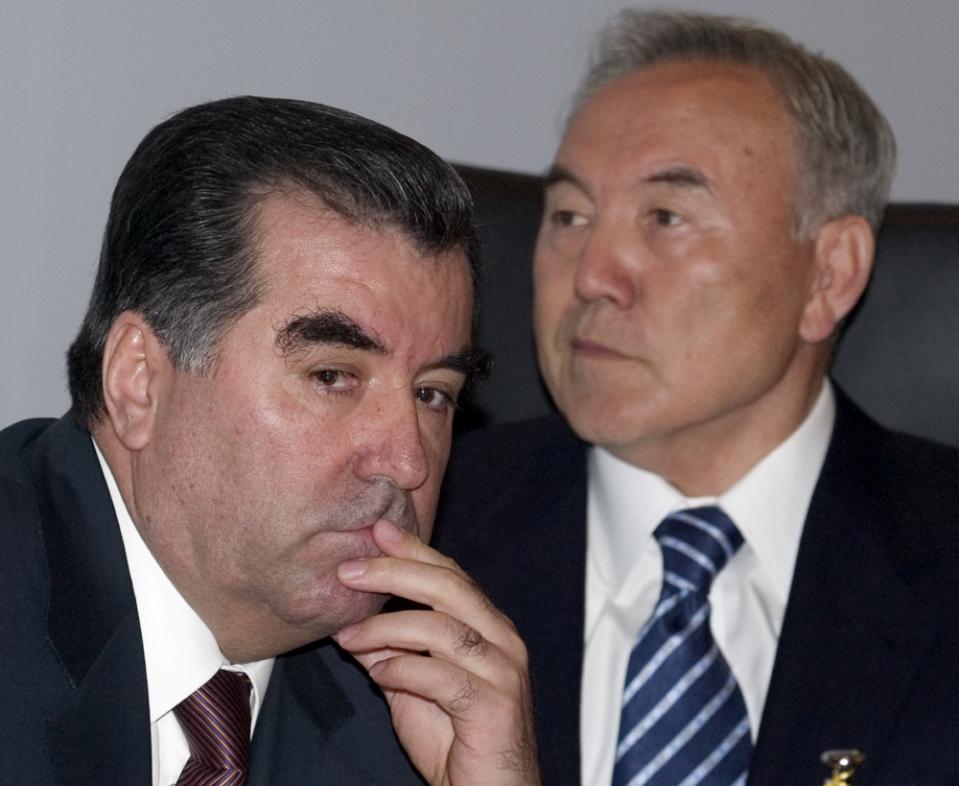 Central Asia's autocratic leaders don't want to be liked. They want to be adored. When the Soviet Union collapsed, a clutch of nations emerged in the vast areas of steppe and mountains between Russia's southern border down to Iran and Afghanistan.
Central Asia's autocratic leaders don't want to be liked. They want to be adored. When the Soviet Union collapsed, a clutch of nations emerged in the vast areas of steppe and mountains between Russia's southern border down to Iran and Afghanistan.
Democracy was rarely given much serious consideration by the rulers of these weak and shaky new entities. Instead, an authoritarian brand of power was wielded and the countries' leaders have at various stages become subjects of personality cults designed to make their pre-eminence appear not just preferable but inevitable.
The region's poorest country, Tajikistan, voted Sunday to remove the final impediment to President Emomali Rakhmon running for office indefinitely. This will in effect allow the 63-year-old former collective farm boss to rule for life, since all real opposition has been systematically obliterated through bogus prosecutions and, on occasion, killings.
WHAT DOES RAKHMON'S CULT OF PERSONALITY LOOK LIKE?
Among all Central Asian leaders, Rakhmon may be the one whose face appears on the most billboards and posters. Giant pictures of the president at work are everywhere: the president standing in a field, the president on a construction site, the president surrounded by children, and so on.
Public shows of praise for Rakhmon, who has been at the helm since 1992, have long been required of the cowed population, and this tendency has intensified in recent times. In December, the rubber-stamp parliament voted to elevate Rakhmon to the freshly devised status of "Leader of the Nation" — a title intended to tell the nation that he is no regular president.
At the same time, the state propaganda machine went into overdrive to make sure the message got home. An essay competition was held among schoolchildren for the best written work expressing admiration for Rakhmon. A university in the capital offered lectures titled "Emomali Rakhmon — the architect of a new Tajik state" that were more extended eulogies than educational talks. The president's name and newly minted title were earlier this year lent to a village and an orchard in a precedent that looks certain to be repeated.
WHAT OTHER CENTRAL ASIAN LEADERS HAVE SIMILAR PERSONALITY CULTS?
Rakhmon's title almost certainly was copied from Kazakhstan, where President Nursultan Nazarbayev was elevated to Leader of the Nation in 2010. That status gave the president indefinite freedom from prosecution and privileges in decision-making on important issues even after he leaves office — not something the 75-year-old ex-Communist Party boss has displayed any desire to do soon.
The creation of the Leader of the Nation title was followed by an extravagant exercise in myth-making. Lavish biopics, plays and children's fairy-tale books praising Nazarbayev began being issued regularly. It was nothing new since Kazakhs are used to effusive praise for their president: Posters bearing his image and laudatory slogans dot the countryside, and reports on state media are filled with his accomplishments.
ARE THERE MORE EXTREME EXAMPLES IN THE REGION?
The mother of all personality cults in Central Asia belonged to the late president of energy-rich Turkmenistan, Saparmurat Niyazov, who went by the title Turkmenbashi, or father of all Turkmens. Right up to his sudden death in late 2006, gold-leafed statues of Niyazov were going up all over the country and his two-tome spiritual handbook, the Rukhnama, became required reading for all children and government employees.
When his successor, a seemingly mild-mannered dentist and health minister called Gurbanguly Berdymukhamedov, was installed, it looked like the era of such extravagances might have come to an end. That did not last long.
In 2011, Berdymukhamedov got his own title, Arkadag, or protector of the Turkmens. He is not just the only politician, but the only person, allowed any kind of serious public profile in the country. His official addresses are the subject of countless hours of television coverage. Although the 58-year-old president submits to the inconvenience of elections, just like his regional neighbors, he wins with similar ease. In the last presidential election, held in 2012, he won 97 percent of the votes cast.
The image carved out for Arkadag has seemingly been fashioned to strike a vivid contrast with his corpulent predecessor, who died of heart failure at the age of 66, reputedly after much hard living. Berdymukhamedov is regularly filmed and photographed riding horses, driving racing cars (and winning races), flying helicopters, cycling, jogging and lifting weights. His talents are made to appear endless. He has written books on subjects from diplomacy and medicine to horses and plants. And back in 2009, he dropped in on a newly opened cancer hospital and decided to perform a minor operation, according to an official news account at the time.
Finance.Yahoo.Com, 23.05.2016




